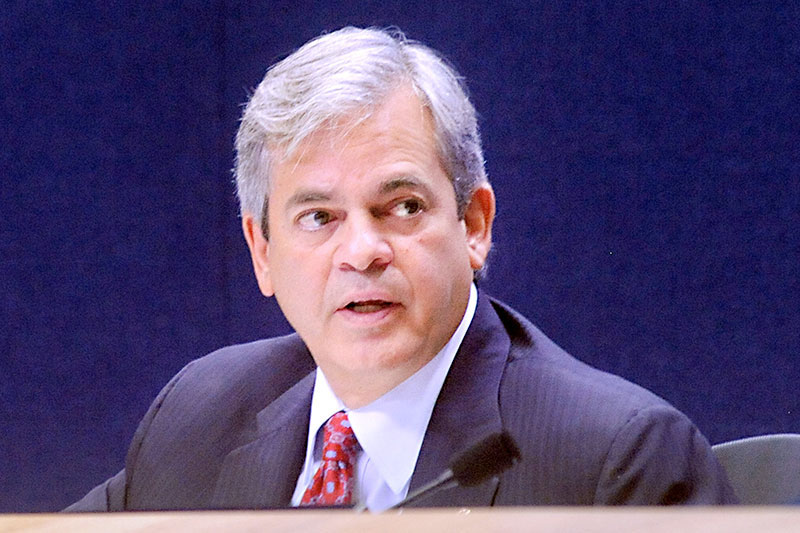What Is a “Sanctionable City"?
Adler says Sessions and ICE backtrack on deportation sanctions
By Michael King, 2:25PM, Tue. Apr. 25, 2017
In a phone conversation with the Chronicle from D.C., Mayor Steve Adler described mayors’ meetings with Attorney General Jeff Sessions and acting ICE Director Thomas Homan. Both say they’re after “serious criminals,” and that “detainer requests” are just that: requests.
On Monday, Mayor Adler joined other members of the U.S. Conference of Mayors in Washington, D.C., in reaction to letters sent last week by Attorney General Sessions to nine jurisdictions across the U.S., mostly cities, asking officials to provide proof they are complying with federal immigration law – specifically requirements that local law enforcement “share information” concerning arrestees with agents of the Immigration & Customs Enforcement Agency. In a statement released Monday, Adler said the mayors wanted to hear from Sessions clarification of a vexed question: “What is a ‘sanctuary city’”? (“Adler, Mayors to Meet with Sessions,” April 24)
Adler said he questioned Homan and Sessions on the Trump administration's definition of “sanctuary” and what they consider local violations of relevant federal law. In brief, he said both officials answered that the current practices of Austin and Travis County do not violate federal law, and do not “prevent or hinder” federal enforcement. More specifically, Adler said he received assurances that local police are not required to determine immigration status of arrestees nor to participate in ICE immigration actions. And in response to specific questions by Adler and other mayors, Homan and Sessions said that under federal law, “detainer requests” (made by ICE to the Travis County Sheriff’s Office to “detain” arrestees pending potential deportation) are indeed “voluntary,” and subject to case-by-case decisions by the local authorities.
Adler said he was “really surprised and pleased by the level of specificity” the discussions achieved, especially following an earlier mayors' meeting with Secretary of Homeland Security John Kelly, which provided brief assurances from Kelly that his agents are pursuing only “dangerous criminals.” (“No Sanctuary,” March 30)
Homan and Sessions reiterated those assurances, but were more willing to be precise about what will be considered “sanctionable” violations of the law by local jurisdictions. Specifically, they cited potential violations of 8 U.S.C. 1373, which requires local jurisdictions to share information with federal immigration enforcement – e.g., fingerprints and other identification information that might demonstrate immigration status. Austin and Travis County law enforcement routinely shares such information with ICE, the FBI, and other federal agencies. (A Jan. 25 executive order issued by President Donald Trump specifically cited violations of 8 U.S.C. 1373 as potentially making local jurisdictions subject to federal sanctions, such as loss of federal grants.)
But Adler said Sessions told the mayors that since local police are not bound to inquire about immigration status, they are not obligated to share information they don’t have. Nor are local police officers required to participate in immigration raids organized by ICE, Sessions said.
Since the declared federal priority for deportation is said to be “serious criminals,” Adler asked why did a majority of those undocumented immigrants apprehended in recent Central Texas ICE raids have no criminal records? Homan said those widely reported statistics are inaccurate, and that he would be providing corrected statistics to local officials. He and Sessions did reiterate, however, that any undocumented person caught up in such a raid would indeed be subject to deportation.
Adler pointed out that in light of these federal clarifications of “sanctionable” actions by local jurisdictions, the immigration-related bills under consideration at the Texas Legislature (e.g., SB 4) attempt to go beyond federal law by requiring full cooperation with federal enforcement, cooperation with every detainer request, and local collaboration in immigration enforcement. “If that’s what becomes state law,” Adler said, “it will likely be subject to a legal challenge.”
Asked if he thought the responses he received in D.C. would be sufficient to reassure most local immigrants of their relative safety from arrest and deportation, Adler said, “I don’t know, but I hope it will help. People are already afraid to have contact with police, even to report crimes, or to take advantage of local services – and we want them to take advantage of those services.” But he said he will return to Austin again reassured that city and Travis County policies, as currently practiced, fully comply with federal law.
For more on this ongoing story, follow the Daily News and the weekly print edition of the Chronicle.
Got something to say on the subject? Send a letter to the editor.
A note to readers: Bold and uncensored, The Austin Chronicle has been Austin’s independent news source for over 40 years, expressing the community’s political and environmental concerns and supporting its active cultural scene. Now more than ever, we need your support to continue supplying Austin with independent, free press. If real news is important to you, please consider making a donation of $5, $10 or whatever you can afford, to help keep our journalism on stands.
Michael King, April 18, 2019
Mary Tuma, Oct. 23, 2017
Michael King, April 24, 2017
Feb. 3, 2025
Nov. 18, 2024
Steve Adler, Jeff Sessions, Immigration and Customs Enforcement Agency, Thomas Homan, Sally Hernandez












